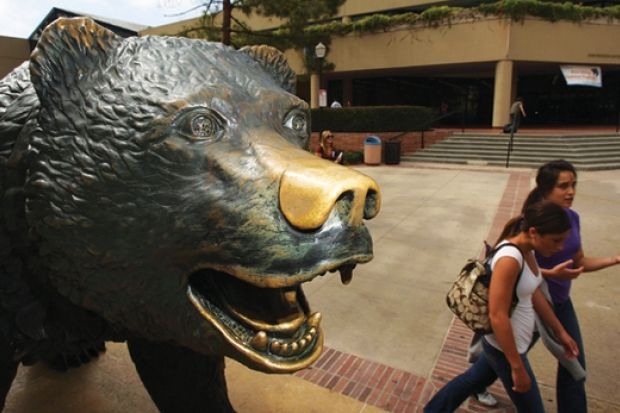The "culture shock" at the University of California, Los Angeles following a surge in the recruitment of international students aimed at meeting funding shortfalls has been laid bare by a senior official.
At the Association of International Education Administrators conference in Washington DC on 20 February, Bob Ericksen, executive director of UCLA's Dashew Center for International Students and Scholars, spoke of concerns about tensions on campus and in the state as a whole.
He warned that despite a generally commendable response on campus to a notorious YouTube clip featuring a "rant" by a UCLA undergraduate about the rising number of Asian students, the incident could be the final straw before something similar "totally polarised" the campus.
Representatives of UCLA, UC Berkeley and UC Davis all spoke of the challenges posed by the rapid growth in international student numbers in a session at the conference.
Delegates at the session, "Aligning the Campus with the Internationalisation Goals of the University", heard that just 3.25 per cent of the University of California system's 2010 undergraduate cohort of 179,562 students were international students.
In a bid to compensate for cuts to public funding, the UC system's target was 6 per cent. This cross-campus drive to recruit more non-US students has brought marked changes at some University of California institutions.
At UCLA, international students currently make up 5 per cent of the ,000 undergraduate body. Mr Ericksen said: "Our goal [at UCLA] is a net increase of 800 undergraduate international students for each of the next three years. It is a complete change in the way that public education is seen in California."
The influx had caused some problems with academic integrity, he acknowledged. "International students remain highly over-represented in terms of cases of academic dishonesty. This is a very serious issue," Mr Ericksen said.
There were also challenges in adjusting to different value systems, educational backgrounds and forms of preparation, while wider tensions in California included local residents fearing further exclusion from the state's already highly selective institutions. "Even some of our own colleagues in student affairs, those who are particularly passionate about the access issues, have questioned this new agenda," he said.
Tensions have manifested themselves in campus relations and have also been highlighted online.
"A year and a half ago, a young woman by the name of Alexandra Wallace - a very attractive blonde UCLA undergraduate in a push-up bra - decided one night to do a YouTube video rant about Asians on campus," Mr Ericksen said.
Although he stressed that the incident and the mass publicity it attracted had "really pulled the campus together in a really positive way...I expect at any moment we are just one small incident like this away from something that could totally polarise the campus."
He said that UCLA was working hard to integrate students and to convey the message that the rise in international students at UCLA was a "win-win situation", that "increasing the number of our non-residential international students will serve the university, California, the nation and the world".
Register to continue
Why register?
- Registration is free and only takes a moment
- Once registered, you can read 3 articles a month
- Sign up for our newsletter
Subscribe
Or subscribe for unlimited access to:
- Unlimited access to news, views, insights & reviews
- Digital editions
- Digital access to THE’s university and college rankings analysis
Already registered or a current subscriber? Login
